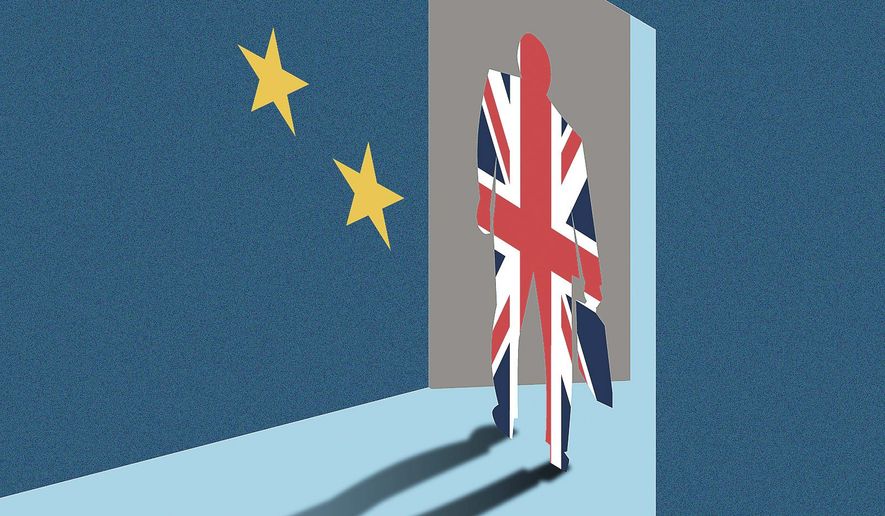OPINION:
Great Britain remains mired in political uncertainty over Brexit, but one English lawyer, Robin Tilbrook, believes the U.K. already left the EU at 11 p.m. on March 29, and he is fighting a long legal battle to try to prove it.
His argument is that, for the original and legally-binding “Exit Date” to be postponed, the law should have been changed by an act of Parliament.
Instead, Theresa May hopped on a plane to ask the EU for more time to get her deal passed through Parliament. The British government then used what is known as a “Statutory Instrument” to make the necessary changes to U.K. law, instead of a full act of Parliament.
The new Exit Date they agreed on was April 12, but after her Withdrawal Agreement, which had been voted down three times already, failed to even get a fourth chance the law was changed again — this time by an act of Parliament and pushed back to Oct. 31.
So, if Parliament was needed to change the second proposed Exit Date, why not also the first?
Could it be that lawmakers realized they had acted improperly in March, so corrected it for April and hoped that no one would notice?
The circumstances around changing the April 12 date were also highly controversial. The government passed the law to do so by just one vote and, of those who voted in favor, one Labor MP, Fiona Onasanya, was on early release from jail and has since been removed from office and struck off as a lawyer.
She was also under home detention curfew, so it is not clear how she was allowed in Westminster for the late vote. Furthermore, laws usually take weeks to be passed, yet this one was rushed through in a day.
In his challenge to the March 29 Exit Date, Mr. Tilbrook has been supported by retired Court of Appeal Judge Richard Aikens, who stated it is “strongly arguable” that the U.K. “may be out” and, “It must be arguable that the Government has acted illegally.”
Having had his initial case rejected, Mr. Tilbrook sought to appeal, but his application was dismissed by Appeals Judge Lord Justice Hickinbottom, as “Totally without merit.”
That seems very strong language for an appeals court judge to use against the reasoning of his former colleague, Sir Richard Aikens, but totally without merit is a legal device that sets a seven-day limit on applying for an appeal, or the case gets blocked.
It took two months for the court to rule against Mr. Tilbrook’s case and by then he was on a two-week holiday.
The documents informing him were not sent by email, as all their other court communications had been and which he could have viewed anywhere, but by snail-mail to his now empty office. Mr. Tilbrook wonders if this was intentional. Had he not had the foresight to ask someone to check the post in his absence, it would have been time-out on his legal campaign that has clearly embarrassed the establishment.
But why did the judges refuse to hear his case in the first place?
Mr. Tilbrook claims, “Given that this is a case that very many lawyers and distinguished members of the judiciary think has strong legal credibility, this decision can only be based upon the Judge’s politics.”
One of the two judges, Lord Justice Hickinbottom, is a fellow of the European Law Institute set up to “evaluate and stimulate the development of EU law, legal policy, and practice … and for the enhancement of EU law implementation by the Member States.”
Mr. Tilbrook has, ironically, had to take his case to the European Court of Human Rights to determine if the U.K. appeals court decision was simply due to the political orientation of the judge.
That could take a long time, but Mr. Tilbrook is more hopeful that the U.K. appeals court will finally hear his case.
If he ever does succeed in proving that Britain left the EU back in March, this would surely cause havoc across the entire continent. Think of the contracts that would be invalid and the tariffs that could have already been levied, not to mention the billions of dollars of unnecessary contributions the U.K. has since made to the EU.
Mr. Tilbrook suggests that to avoid that chaos, the Exit Date could be backdated instead to just a few days prior to the date of a new court ruling.
At the moment this is all hypothetical, but if he is successful at least Mr. Tilbrook would have solved the problem of getting Britain out of the EU — for the prime minister and for everyone else.
That should be worth a knighthood but, having challenged the establishment, it is very unlikely that would ever happen — ask Nigel Farage.
• Andrew Davies is a U.K.-based video producer and scriptwriter.




Please read our comment policy before commenting.